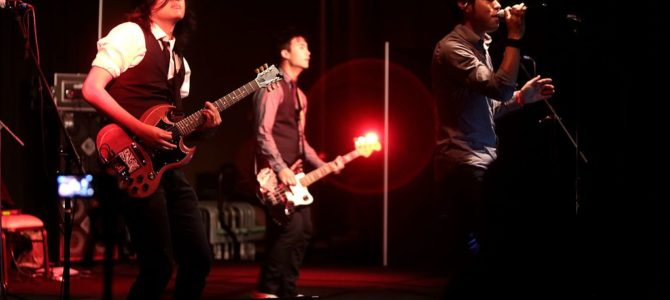
You may have heard about a weird Supreme Court case asking whether an Asian-American rock group called The Slants can own their own name. These rockers, led by Simon Shiao Tam, formed an identity “to take on these stereotypes that people have about us, like the slanted eyes, and own them.”
Not everyone agrees with that approach to “taking back” a derogatory label, but the artistic marketplace should decide the issue, not the government—which punished the band by denying them federal trademark registration.
Well, in a unanimous ruling Tuesday that splintered on its reasoning, the high court correctly held that the “disparagement clause” of the Lanham Act (the federal trademark law) violated the Constitution. The ruling in Matal v. Tam boils down to the simple point that bureaucrats shouldn’t be deciding what’s “disparaging.”
Trademarks, even ones that may offend many people—of which the Patent and Trademark Office (PTO) has registered plenty—are private speech, which the First Amendment prevents the government from censoring. As Justice Samuel Alito put it in a part of the opinion that all the justices joined (except Neil Gorusch, who didn’t participate in the case), “If the federal registration of a trademark makes the mark government speech, the Federal Government is babbling prodigiously and incoherently.”
It can’t possibly be that the full weight of the U.S. government stands behind such venerable slogans as “Capitalism Sucks Donkey Balls” and “Take Yo Panties Off,” as I described in my amicus brief on behalf of a “basket of deplorable people and organizations” that included P.J. O’Rourke, Flying Dog Brewery, and the Comic Book Legal Defense Fund. (For a more comprehensive list of registered marks that puts paid to the idea that trademarks constitute government speech, and any objective principle stands behind the disparagement clause, see the appendix to the brief of the Washington Redskins, whose trademarks should now be safe.)
The Court Divides Its Reasons for Agreeing
At this point, the Supreme Court split. Justice Alito, joined by Chief Justice John Roberts and justices Clarence Thomas and Stephen Breyer, explained why trademarks don’t constitute a subsidy or other type of government program (within which the government can regulate speech), and that the disparagement clause doesn’t even survive the more deferential scrutiny that courts give to restrictions on “commercial” speech.
The remaining four justices, writing through Justice Anthony Kennedy, would’ve ended the discussion after finding that the PTO was engaging in viewpoint discrimination against certain kinds of private speech. The government argued that the provision is viewpoint-neutral because it applies equally to any trademark that offends anybody. “The logic of the Government’s [argument],” Kennedy responded, “is that the law would be viewpoint neutral even if it provided that public officials could be praised but not condemned.”
Showing that the division among the court’s members was somewhat artificial, Kennedy’s point echoed Alito’s analysis of the disparagement clause as “not an anti-discrimination clause; it is a happy-talk clause.” Likewise, the meaning and significance of the case as a whole can be summed up by the end of Kennedy’s opinion, which is worth quoting in full:
A law that can be directed against speech found offensive to some portion of the public can be turned against minority and dissenting views to the detriment of all. The First Amendment does not entrust that power to the government’s benevolence. Instead, our reliance must be on the substantial safeguards of free and open discussion in a democratic society.
In essence, this unusual case brought by an electronic-rock band shows that government can’t force you to choose among your rights. The Lanham Act’s disparagement clause placed an unconstitutional condition on those who consider the use of an edgy or taboo phrase to be part of their brand: either change your name or be denied the right to use it effectively.
The Slants picked a name that, through its insouciance, expresses something about their music—and the government’s jejune label of “disparaging” fails to capture the many levels of communication inherent in that moniker. Think about what would have happened had The Slants chosen a less controversial name, such as “Four Asian-American Men Who Are Very Respectful of Our Diversity as a Nation.” Someone attending a show by such a band might well find it especially alarming to only then discover that the band’s songs contain such lyrics as (in reference to a schoolyard taunt) “Chinese, Japanese, dirty knees, look at these.”
Everyone who sometimes finds himself lumped into a “basket of deplorables”—hey, that’s a great band name!—should be glad that the Supreme Court has now let people judge for themselves what’s derogatory. Whether you’re a musician, politician, or sports team, it’s civil society (consumers, voters, fans) who should decide whether you’re being too offensive for polite company.








